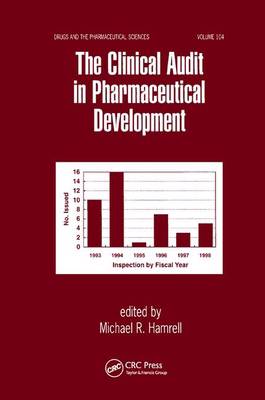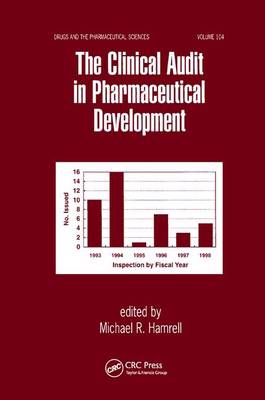
Door een staking bij bpost kan je online bestelling op dit moment iets langer onderweg zijn dan voorzien. Dringend iets nodig? Onze winkels ontvangen jou met open armen!
- Afhalen na 1 uur in een winkel met voorraad
- Gratis thuislevering in België vanaf € 30
- Ruim aanbod met 7 miljoen producten
Door een staking bij bpost kan je online bestelling op dit moment iets langer onderweg zijn dan voorzien. Dringend iets nodig? Onze winkels ontvangen jou met open armen!
- Afhalen na 1 uur in een winkel met voorraad
- Gratis thuislevering in België vanaf € 30
- Ruim aanbod met 7 miljoen producten
Zoeken
The Clinical Audit in Pharmaceutical Development
€ 126,95
+ 253 punten
Omschrijving
This blue-chip guide adds quality to the pharmaceutical clinical development process by detailing the need for, and stressing the importance of, an independent audit of clinical data to protect participants and validate study results.
Examines the use of personal computers, the Internet, and third-party organizations to assist in data validation!
Positioning the audit as the only reliable tool to verify that a drug has been shown to be safe and effective in clinical trials, The Clinical Audit in Pharmaceutical Development
Confirming that all clinical information has been properly collected and reported, The Clinical Audit in Pharmaceutical Development is a crucial reference for clinical and research pharmacists and pharmacologists; biostatisticians; clinical research associates, coordinators, and investigators; quality control, quality assurance, and regulatory compliance managers; and upper-level undergraduate and graduate students in these disciplines.
Specificaties
Betrokkenen
- Uitgeverij:
Inhoud
- Aantal bladzijden:
- 216
- Taal:
- Engels
- Reeks:
- Reeksnummer:
- nr. 104
Eigenschappen
- Productcode (EAN):
- 9780367399337
- Verschijningsdatum:
- 5/09/2019
- Uitvoering:
- Paperback
- Formaat:
- Trade paperback (VS)
- Afmetingen:
- 152 mm x 234 mm
- Gewicht:
- 453 g

Alleen bij Standaard Boekhandel
+ 253 punten op je klantenkaart van Standaard Boekhandel
Beoordelingen
We publiceren alleen reviews die voldoen aan de voorwaarden voor reviews. Bekijk onze voorwaarden voor reviews.










